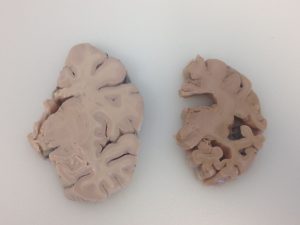*Featured image: A sample of healthy brain tissue (left), and one ravaged by Alzheimer’s disease (right).
Memory makes you who you are. Dementia slowly robs you of that. Your personality, the experiences that have shaped you, that you’ve shared with the people you love, your ability to carry out everyday tasks like dress, wash and feed yourself, the words you need to communicate with people. It all slips away.
But dementia doesn’t just affect your memory. This model from Alzheimer’s Research UK shows how dementia can affect different parts of the brain, and this moving short film shows how dementia can impact on visual perception.
There are currently more than 944,000 people living with dementia in the UK, and more than 55 million people worldwide. This number is expected to almost double every 20 years. Unfortunately this means that most people will be affected by dementia at some point in their lives, yet it is a condition that most people know very little about. We want to change that.
Remembering Not To Forget trustees have written about their personal experiences of dementia in a series of blogs.
We also want to emphasise the five key messages shared by the Dementia Friends initiative:
-
Dementia is not a natural part of aging
Not everyone who grows old will develop this disease, and not everyone who develops dementia is old.
One in three people over 65 will develop dementia, but it also affects younger people. There are currently estimated to be over 40,000 people under 65 living with early-onset in the UK, however the number is likely to be much higher as people often do not seek a diagnosis at a younger age. People as young as 30 have been diagnosed with dementia.
Raising awareness of dementia in younger people is one of our Remembering Not To Forget’s central aims. You can read more about organisations offering support to younger people with dementia on our resources page.
-
Dementia is caused by diseases of the brain
Dementia is the name for a collection of progressive symptoms which include memory loss, mood changes and problems with communication and reasoning. These symptoms are brought about by a number of diseases that cause changes in the brain. The most common of these is Alzheimer’s disease (affecting 62% of those living with dementia), which changes the chemistry and structure of the brain causing the brain cells to die.
Other types of dementia include vascular dementia and Pick’s disease
-
Dementia is not just about losing your memory
People often think of dementia as a form of memory loss, and usually it does start by affecting people’s short-term memory. But it’s more than that – it can also affect the way people think, speak, perceive things, feel and behave. Dementia makes it harder to communicate and do everyday things, but there is a lot that can be done to help. Every year we understand more about dementia, and develop new strategies that can help to boost someone’s confidence and maintain their independence for as long as possible.
-
It’s possible to live well with dementia
Most of us have an image in our mind of what life with dementia looks like. That image is often very bleak. Dementia does of course bring many challenges, but with the right knowledge and support it is possible to live well with dementia for a long time.
What people can do and how long they can do it for will depend on the circumstances of each individual. People with dementia can continue to drive, socialise and hold down satisfying jobs. Even as dementia progresses, many people lead active, healthy lives, continue their hobbies, and enjoy loving friendships and relationships.
-
There’s more to a person than the dementia
Life doesn’t end when dementia begins. When someone is diagnosed, their plans for the future might change and they may need more help and support to keep doing the things they enjoy. However, just as we would look at someone with cancer or diabetes and see a person first, there is more to the person than the dementia.
Some of us do become more forgetful as we get older or during times of stress or illness, but dementia is a different sort of forgetfulness. The memory loss will be more noticeable, and may be accompanied by mood changes and confusion. If you’re worried about memory loss it is important to ask your GP to check out any unusual symptoms as these can sometimes be treated with appropriate medication. Check here for more information.
Looking for more information about dementia? Check our handy list of resources. Please note that this list is no longer being updated and so some of the information may be out of date.

